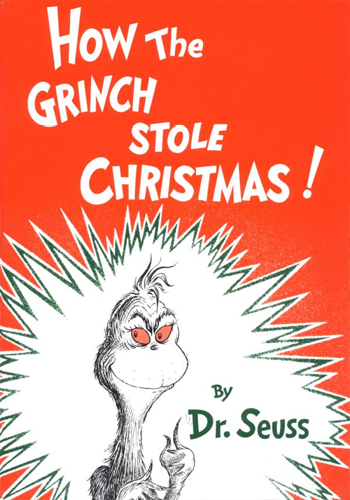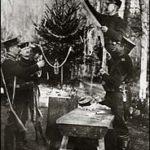Speculative Christmas, Part 4: A New Peace
The fourth candle flickers in the Advent wreath—the Angels’ Candle, the Candle of Peace. The final chorus of the heavenly choir still reverberates in the chill midnight air:
Glory to God in the highest, and on Earth peace, goodwill toward men.
Peace? But we’re in a war now. The pagan hordes, with their serial shopping, and mulled cider, and solstice-worshipping, and Satan Claus, and lightbulb-nosed reindeer are about to steal something precious from us. They don’t understand the real meaning of Christmas. Why won’t they stop meddling with it and leave us to mark the birth of our Savior in reverent contemplation?
…for behold, I bring you good tidings of great joy, which shall be to all people.
Stupid angels couldn’t even get their lines right. They were clearly supposed to say all believers. Those other people can’t even comprehend what they’re supposed to be celebrating. One more excuse to throw a party.
I’d like to propose, just for a moment, that they do get it. They may not know what to do with it, not yet, but on some level, the lost of this world who have heard about Christmas understand that something miraculous happened 2000 or so years ago, something that made the world different, and they want a piece of it. They know it’s not really about the presents, and the parties, and the tinsel. You can read any number of secular Christmas stories centered on this very theme. They’re about hope, and love, and joy, and peace. All the things they really want out of life, when it comes right down to it. The same gifts carried to Earth by the Savior whose birth we Christians celebrate.
 As an example, I’d like to consider one of the most popular and enduring secular Christmas stories ever written. It’s a fantasy, and a children’s story: How the Grinch Stole Christmas! by Dr. Seuss.
As an example, I’d like to consider one of the most popular and enduring secular Christmas stories ever written. It’s a fantasy, and a children’s story: How the Grinch Stole Christmas! by Dr. Seuss.
It’s a very simple yet profound tale, written with Theodore Geisel’s trademark wit and clever poetry. The Grinch, a nondescript, grouchy hermit, peers down from his mountain lair and contemplates the impending Christmas festivities of his neighbors, the Whos. The Grinch’s quiet solitude is shattered every December by their raucous merrymaking. This year, he’s determined to put a stop to it once and for all. But how?
He hatches a rather elegant, if harebrained, plan. He’ll don a Santa Claus disguise and swoop into sleeping Whoville on Christmas Eve, steal all their presents and holiday frippery, and then dump it off the side of a mountain. No presents, no Christmas, and a town full of quiet, miserable Whos. The best of all possible worlds.
Improbably, the Grinch succeeds, and as he prepares to jettison all the loot, he pauses to listen for the Whos’ wails of despair as they wake to discover their houses stripped and their gifts plundered.
But there are no wails. Instead, the Whos gather around their now Christmas tree-less town square, join hands, and sing—just as they do every year. The Grinch is perplexed, and in a bolt of revelation, realizes he’s gotten the whole thing wrong. He’s mistaken their generosity for materialism, and their fellowship for self-indulgent revelry. The fooflunkers and gardinkers are only incidental to the Whos’ celebration. Christmas is about what they’re doing in that empty town square, together, right now.
It rocks his world. A transformed Grinch swoops back into Whoville, returns all the things he’s stolen, and joins in their feast with a revived and expanded heart–and the promise of a better, fuller, richer life ahead.
In like manner, even among the clutter of trees and elves and snowmen at Christmastime, people’s hearts turn toward the families they may have been neglecting, or the poor and suffering neighbors they’ve ignored.
 Even in the midst of bloody conflict that makes our “Culture Wars” look petty and trivial by comparison, armies have paused their bullet shooting and grenade launching and bomb dropping as a tenor voice drifts across no-man’s land: “Stille Nacht, Heilege Nacht, Alles schläft; einsam wacht…” And another voice joins in, and another, and then a dozen more, from across the trenches: “Silent Night, Holy Night…Douce nuit, sainte nuit…”
Even in the midst of bloody conflict that makes our “Culture Wars” look petty and trivial by comparison, armies have paused their bullet shooting and grenade launching and bomb dropping as a tenor voice drifts across no-man’s land: “Stille Nacht, Heilege Nacht, Alles schläft; einsam wacht…” And another voice joins in, and another, and then a dozen more, from across the trenches: “Silent Night, Holy Night…Douce nuit, sainte nuit…”
Enemies and allies cross battle lines to shake hands, and for a moment, they all listen in wonder. It’s not hard to imagine the angels joining in the chorus, even here, even now.
And for nearly fifty years in America, television executives who wouldn’t dare let a breath of religion onto the prime-time airwaves for fear of offending someone have put a little cartoon boy into a spotlight on an abandoned stage and let him tell the story of Christmas straight from the Bible.
“…and that’s what Christmas is all about, Charlie Brown.”
So, I urge you, don’t be stingy this year with the gifts you’ve so generously received from on high, and don’t begrudge those still wandering a glimmer of that same illumination, just as freely given. Don’t fear the distractions. The truth is more powerful than any number of myths, legends, or advertising agencies. Satan may be the author of many reprehensible and deceptive works, but he is most certainly not the author of hope, or love, or joy, or peace. And he can’t stop Christmas from coming or steal it away from us. He failed at that scheme a long, long time ago. Paraphrasing Dr. Seuss:
It came despite presents.
It came despite tags.
It came despite packages, boxes and bags.
He hadn’t stopped Christmas from coming. It came!
Somehow or other, it came, just the same.












































I love the Charlie Brown Christmas special. To be fair, though, I also love Doctor Who Christmas specials, which generally involve aliens invading London and the opposite of peace, love and joy.
Mr. Copper: It’s a festival of violence! They say that human beings only survive depending on whether they’ve been good or bad! It’s barbaric!
The Doctor: Actually, that’s not true. Christmas is a time of, of peace, and thanksgiving, and… Oh, what am I on about? My Christmases are always like this!
–Voyage of the Damned.
Doctor Who Christmas Specials are the BEST!! They are so amazing, in fact, that this year we’re holding a Doctor Who Christmas Special Party to watch it with friends. 😀
A wonderful peace-making article.
Whoa!
Yes indeed, Fred. This doctrines-of-grace minded brother couldn’t agree more.
Notice the angel also didn’t announce “tidings of great joy, which shall be to all the Jews.” Instead he broadened the perspective. And Luke’s gospel’s inclusion of lowly shepherds, and Matthew’s inclusion of Gentile wise men from a pagan land, all come to see the newborn Savior, reinforces this truth: Christ has come for all sorts of people.
At last, back goes God’s plan announced from the beginning, not just to be a light to the Jews, but for them to spread His light to the “outsiders,” the “pagans” — the Gentiles.
A final note on this, from the ESV Study Bible commentary:
I had a WALL-E flashback when I read that. 🙂
Yeah, it’s easy to fall into a sort of fortress mentality this time of year and get so focused on trying to fight off the world we forget that we’re called to share the Good News with everyone in it.
That’s kind of how I felt as I wrote this. This week is about peace, and it was like I was sitting in a bunker, shellshocked. Time to walk across No Man’s Land and shake a few hands.
Great post, Fred! 🙂 Perhaps it’s because I love all the “trappings” of Christmas a lot, but it rubs me the wrong way just a little bit when people talk about “simplifying” Christmas to get back to the “true meaning”. To me all the trappings and celebration and rich food and well-wrapped gifts are PART of Christmas. (This post also went out into the blogosphere today, and I thought there was a bit of a connection between it and your closing words: http://www.feminagirls.com/2011/12/20/why-do-we-give-gifts-anyway/#more-3886)
That’s a great article, Bethany, and I liked the Narnia reference–that scene always comes to my mind this time of year.
I don’t have any problem with people “simplifying” their Christmas, or celebrating lavishly. I think there’s room for both the splendor and expansiveness of the angels and Magi and the quiet, lamplit awe of the stable and the shepherds. It’s more a question of why we’re doing what we’re doing. When we turn the focus of Christmas onto ourselves by using it as an occasion to find fault with each other or feel superior because we’re celebrating a certain way, we’re missing the whole point.
I agree! Nicely put. I think the reason the simplifying trend annoys me is because often its proponents seem to view the more expensive, complex celebrations as overkill. I have nothing at all against a simple Christmas! But personally I love all the trimmings and trappings!
[…] Quote for today: “I urge you, don’t be stingy this year with the gifts you’ve so generously received from on high, and don’t begrudge those still wandering a glimmer of that same illumination, just as freely given. Don’t fear the distractions. The truth is more powerful than any number of myths, legends, or advertising agencies. Satan may be the author of many reprehensible and deceptive works, but he is most certainly not the author of hope, or love, or joy, or peace. And he can’t stop Christmas from coming or steal it away from us. He failed at that scheme a long, long time ago.” – Fred Warren in today’s post over at Speculative Faith. […]